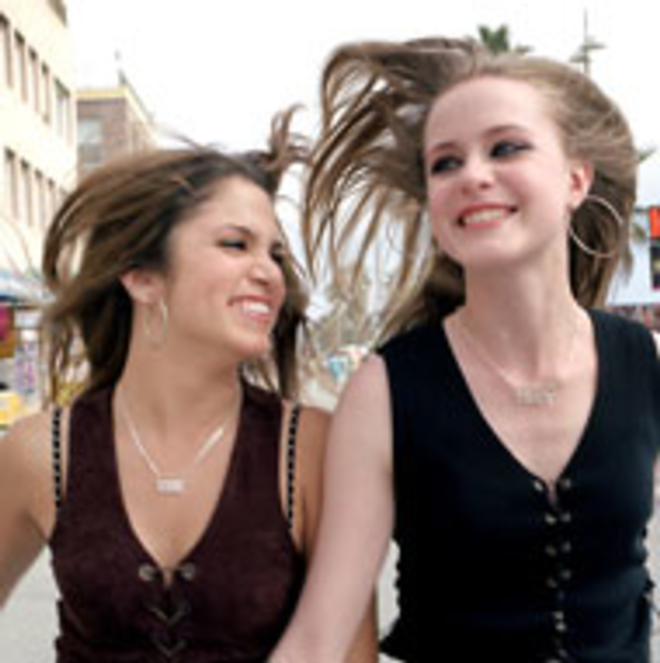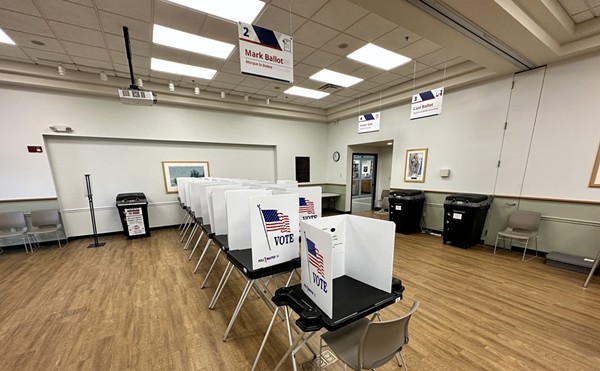You can practically smell the brain cells frying in the button-pusher of a sequence that opens the new movie Thirteen. Two stoned and hugely grinning girls, both about the age suggested by the movie's title, are seen bouncing around on a bed while huffing huge amounts of nitrous oxide. They're way past making sense, and barely able to contain their glee at how deliciously numb their bodies seem to have become.
"Hit me," pleads the blonde one between giggles, to which the darker-haired one responds with a polite but forceful slap to the face. "Harder," says the blonde, laughing, whereupon her happily toasted companion lets loose with a full-blown punch that brings blood and smashes her friend's head against the bedroom wall. The bloodied blonde still isn't satisfied, though. The pounding continues until the happily battered teen giggles and says "I can't feel anything!" one final time and loses consciousness.
In the world of Thirteen, this brutal and brutalizing camaraderie is the early-21st-century equivalent of a pillow fight, and the movie wields the scene bluntly as a metaphor for the desensitizing of modern youth. Never mind that Fight Club got there first (and went further with it) — Thirteen's consensual slugfest is still pretty strong stuff, and very nearly the best thing in the entire movie.
For what it's worth, the Fight Club analogy probably isn't the best way to approach Thirteen, since the latter film is only marginally about violence, per se, and certainly doesn't pretend to take on the sum total of society (as Fincher's Fight Club did). A more apt comparison would be to Kids and the other films of Larry Clark, movies that rarely feature anyone over the age of 15, and where teenage angst, alienation and ennui are always at ground zero.
The kids in Clark's films, however, generally seem to spring fully hatched, devoid of history or context, and with no past and most definitely no future. In Thirteen, on the other hand, we actually get a glimpse of the big picture: We see the main character transform, albeit in sketchy and overly rapid fashion, from naive adolescent to dangerously sophisticated not-quite-kid/not-quite-grown-up. If it didn't smack of the highest pretence, we might even be tempted to call the change some sort of Death of Innocence (although that's probably just the concept the film's director is hoping we'll conjure up). In any event, it's a transformation as potentially mysterious and bizarre as a fish spontaneously changing from male to female. It's a shame the film doesn't do more with it.
The character doing the transforming in Thirteen is Tracy (Evan Rachel Wood), a nice girl who hooks up with the infinitely hipper and wilder Evie (Nikki Reed) and then finds her life spiraling out of control. In short order, Evie introduces her new friend to the joys of shopping and shoplifting (although not necessarily in that order), followed by a crash course in the joys of random and copious sex, drugs and body piercing. From there, it only gets uglier.
Perhaps the scariest thing about the movie is that, unlike in most of Clark's screaming visions of youthful nihilism, there are real-life, responsible adult parents present in Thirteen, and all their best-laid plans don't do a thing to alter the tragic course of events. Tracy's mom (Holly Hunter) is hip, smart and basically more like an older sister than a mother — but even that doesn't save her from the girl's eventual disdain and outright hostility. As Tracy's relationship with Evie gets tighter, the one with her mother deteriorates. The symmetry is all part of a melodrama quotient here, and it's pumped up by the movie's unspoken intimations that, at root, mom and daughter are actually birds of a feather. Both fight a nagging self-destructive streak, but each is basically just looking for acceptance and a little bit of comfort.
There are moments of real conviction here, although, ultimately, Thirteen is only partially convincing. The movie was reportedly based on the real-life experiences of its star/co-writer Nikki Reed, but seems as if it could have been modeled after any number of other real and make-believe stories floating around in the pop ether. In any event, despite the occasional ring of truth, Thirteen doesn't really feel like life so much as an amalgam of recycled bits from various, better films about youth in crisis.
Local Notes Friday nights in St. Petersburg just got a lot more interesting, at least for movie lovers. International Cinema at Eckerd College, as if you couldn't guess from the title, is a new series of contemporary and classic films from around the world, presented every week at the Eckerd College campus in St. Petersburg. Each Friday night in the college's Dendy McNair auditorium, two new foreign films will be screened, one at 6:30 and one at 9 p.m. The screenings are absolutely free (although donations are cheerfully accepted) and are wide open to the public.
The series kicked off last week with the recent Dogme feature Open Hearts and legendary Japanese director Shohei Imamura's wonderfully minimalist The Eel. This week things heat up with Chaos, a zippy, feminist revenge fantasy shot in an energetic Run Lola Run style, and Jean-Luc Godard's brilliant but bleak, midlife meditation, In Praise of Love. Chaos and In Praise of Love will be screened on Sept. 19.
The weeks to come are filled with even more gems at Eckerd. The Sept. 26 program features Chi-hwa-seon, a passionate portrait of the artist, Korean-style, along with Wong Kar-Wai's gorgeously lyrical In the Mood for Love. Oct. 3 brings us Iranian director Abbas Kiarostami's rarely seen ABC Africa and Faat-Kine, a recent feature from the great Senegalese filmmaker Ousmane Sembene. October 10's program probes deeper into Iran and environs, with Kiarostami's Close-Up and Mohsen Makhmalbaf's Kandahar.
Upcoming weeks will feature such underseen masterpieces as Russian Ark, Finish filmmaker Aki Kaurismaki's The Man Without a Past, an acclaimed example of the New Chinese Cinema called Unknown Pleasures, and the Cuban import Lucia. Then there's the art house classics Hiroshima Mon Amour, Walkabout and Wings of Desire, and an inspired double- bill of Werner Herzog's Nosferatu with Guy Maddin's Dracula: Pages from a Virgin's Diary. That last program screens on Halloween eve, and I can't imagine a better place to be.
All screenings take place at Dendy McNair auditorium, Eckerd College, 4200 54th Ave. S., St. Petersburg. For more information, call 727-864-8354 or email [email protected].
Lance Goldenberg can be reached at [email protected] or 813-248-8888, ext. 157.

















